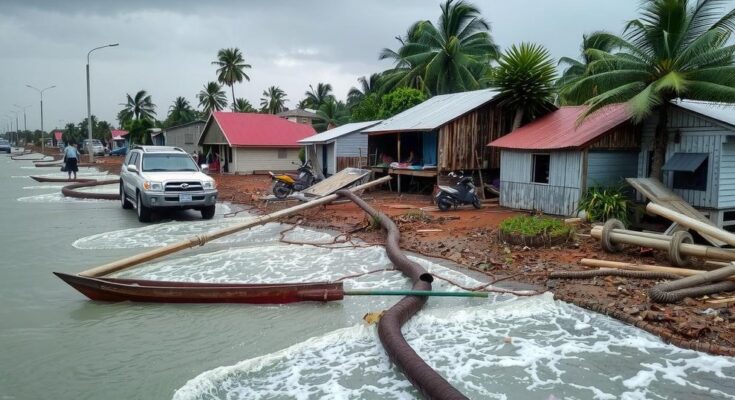The death toll from Cyclone Chido in Mozambique has reached 75, with hundreds injured as rescue teams access devastated areas, particularly in Cabo Delgado province. The cyclone exacerbated existing humanitarian crises linked to a yearslong insurgency, impacting thousands already displaced. This natural disaster underscores the challenges Mozambique faces from climate change and extreme weather events.
Mozambique has reported a tragic increase in the death toll from Cyclone Chido, now standing at 75, nearly doubling the previous figure as rescuers reach hard-hit areas. The cyclone struck Cabo Delgado province earlier this week, a region already suffering from an ongoing insurgency linked to the Islamic State. The devastating storm has resulted in significant injuries and extensive infrastructure damage, particularly in areas like Mecufi, where most buildings were destroyed.
According to the National Institute for Natural Disasters, 69 fatalities and approximately 740 injuries have been attributed to the cyclone, as rescue efforts continue in remote regions hindered by washed out roads. Images from the affected areas depict the severe impact, with mud homes demolished and health facilities heavily affected. In addition, climate shocks have exacerbated the difficulties faced by those already displaced by conflict, particularly in Cabo Delgado, where tens of thousands were living in tents after fleeing recent violence. Cyclone Chido brought wind speeds reaching 115 mph, comparable to a Category 3 hurricane, and also affected the French territory of Mayotte, where at least 31 deaths have been recorded. The cyclone’s landfall in Mozambique may herald the onset of a particularly destructive rainy season, following past cyclones that have claimed numerous lives and displaced thousands, raising concerns for future extreme weather events in the region.
Cyclone Chido has struck Mozambique amidst a backdrop of significant humanitarian challenges, including a persistent insurgency in Cabo Delgado province that has forced many residents to flee their homes. Mozambique is frequently subject to severe weather events due to its geographical location and the impact of climate change. The country is one of the poorest globally, facing continuous threats from storms and flooding, making it increasingly vulnerable during the rainy season, which historically has been associated with cyclones. The ongoing conflict and environmental issues contribute to the complex humanitarian crisis, emphasizing the need for immediate relief and long-term strategies to enhance resilience in affected communities.
In summary, Cyclone Chido has caused widespread devastation in Mozambique, significantly impacting an already vulnerable population affected by conflict and climate change. The tragic increase in the death toll underscores the urgent need for humanitarian assistance as rescue efforts continue. The cyclone not only highlights the immediate dangers posed by severe storms but also the necessity for effective disaster management strategies to mitigate the effects of future climate-related catastrophes in the region.
Original Source: www.nytimes.com




